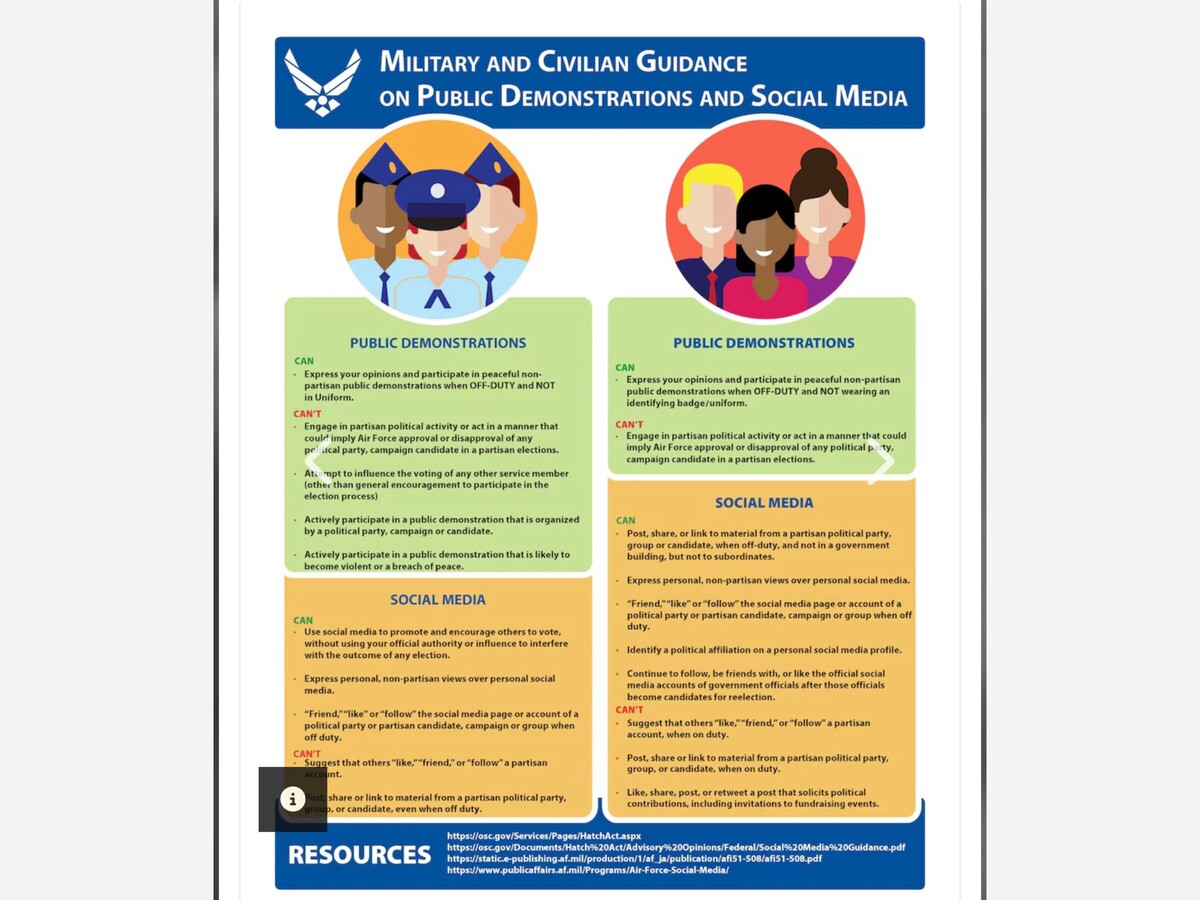Image


The United States military is a nonpartisan institution with a tradition of respecting whomever sits in civilian leadership positions which oversee this nation's military. As political discourse becomes even more partisan and divisive the military must remain neutral is a reminder message that leadership is attempting to convey to all enlisted personnel.
Service members are held to a higher standard than the general public when it comes to expressing their political beliefs. Those standards are governed by policy and enforced by the Uniform Code of Military Justice.
Rules bar service members from appearing partisan while representing the military, including while in uniform, or directing "contemptuous" speech at elected officials, according to military regulations. Other regs prohibit using official authority to influence an election, marching or riding in a partisan political parade, or displaying partisan signs or banners at a residence on post. The first amendment rights of service members is not the same as for civilians and the courts hsve supported that position.
The Department of the Air Force, which also oversees the Space Force, began issuing its own warnings on political activity to airmen and Guardians in the spring. In an Aug. 2 memo obtained from Air Force Secretary Frank Kendall with a message of caution while encouraging all members to exercise their right to vote.
"My expectation is that all personnel will comply with these requirements, but in particular, no one will: wear their uniform at political events; use their authority or position to attempt to influence how others vote; or engage in political activities in the workplace, on government time, or while utilizing government equipment," Kendall said.
"Active-duty members will not engage in partisan political activities, and all military personnel will avoid the inference that their political activities imply or appear to imply [Department of Defense] sponsorship, approval or endorsement of a political candidate, campaign or cause," Pentagon policy states.
The Marine Corps' latest force-wide directive, issued Aug. 12, comes in response to a July 17 message to troops from Navy Secretary Carlos Del Toro on the merits -- and pitfalls -- of participating in the political process.
"The Department of the Navy celebrates democracy and is committed to continuing to support and defend the Constitution of the United States, as our sailors, Marines and civilian personnel have done for nearly 250 years," the department-wide memo said. "Now that the 2024 election season is upon us, it is more important than ever for us to remember that the [Department of the Navy] is an apolitical body. ... Public trust and confidence depend on this."
Commanders across the department must ensure their subordinates are briefed on the do's and don'ts by the deadline or -- in case operational requirements get in the way -- run a request for an extension up the chain of command, the memo said.
The Army created a training video for soldiers and service civilians on restrictions around politicking, issued prompts on scenarios troops might face, and incorporated political issues into its annual ethics training.
Social media as an environment where service members often get in trouble for breaking apolitical rules.
"While you're in uniform on active duty, collecting a paycheck every 1st and 15th from the Department of Defense, it's probably a great idea for you not to voice your opinions about elected officials on social media," said a spokesperson to in response to an inquiry from AlamogordoTownNews.org.
Reservists who are not on active-duty orders face similar restrictions, including a ban on using their military rank, title and photos in uniform as part of campaign literature to imply a military endorsement
Violations of those policies are punishable under the Uniform Code of Military Justice, including Article 92, for failure to obey a lawful order; Article 88, for contempt toward officials; or any applicable provision of military or federal law.
Federal employees' partisan activities are also restricted by the Hatch Act, the 1939 law designed to prevent executive branch workers from using their office to push a campaign agenda.
Service members and their families are allowed to vote using absentee ballots while stationed away from their home of record in the United States or overseas. According to the Federal Voting Assistance Program, three-quarters of active-duty troops are eligible to vote via absentee ballot because they are stationed away from their election residence.
A military leader speaking to us off the record said,"we want our troops to vote but we also want them to avoid destroying their careers by engaging in public relations or social media discussions that could get them in trouble, so these reminders are important during this very heated and divisive period of election season."